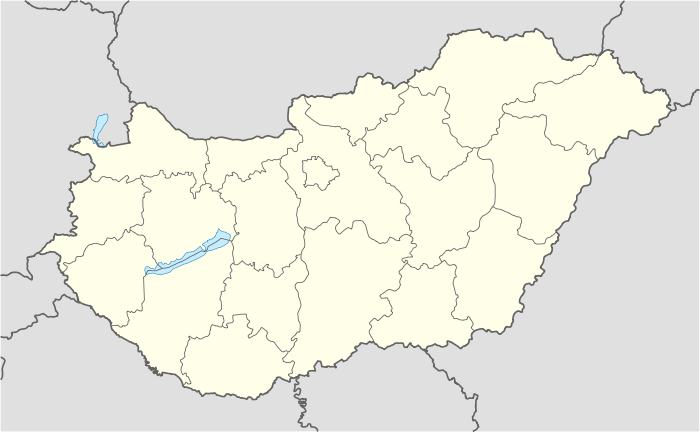Rajka
| Rajka | ||
|---|---|---|
| ||
 Rajka Location of Rajka | ||
| Coordinates: 47°59′49″N 17°11′54″E / 47.99689°N 17.19832°ECoordinates: 47°59′49″N 17°11′54″E / 47.99689°N 17.19832°E | ||
| Country |
| |
| County | Győr-Moson-Sopron | |
| Area | ||
| • Total | 52.63 km2 (20.32 sq mi) | |
| Population (2011) | ||
| • Total | 2,758 | |
| • Density | 52.4/km2 (136/sq mi) | |
| Time zone | CET (UTC+1) | |
| • Summer (DST) | CEST (UTC+2) | |
| Postal code | 9224 | |
| Area code(s) | 96 | |
Rajka (German: Ragendorf, Croatian: Rakindrof [1]) is a village in Győr-Moson-Sopron county, Hungary.
Geography
Rajka is located in the Little Hungarian Plain 17 km north-west of Mosonmagyaróvár, near the point where the borders of Hungary, Austria and Slovakia join. M15 motorway (E65/E75), Highway 150 and the Budapest-Hegyeshalom-Rajka railway line all cross the village.[2] The Hungarian-Slovak border crossing between Rajka and Čunovo ceased to operate on 21 December 2007, when Hungary and Slovakia acceded to the Schengen Area.[3]
History
Rajka was established before the 13th century.[3] According to the Hungarian Royal Treasury (Magyar Királyi Kincstár) it was an ethnic German settlement in Hungary, called Rackendorf in 1495.[4] In the 18th century it was a market town (mezőváros) in Moson County. The Jewish community was forcibly deported in 1944. After the Soviet occupation of Hungary in 1946, 859 German civilians were expelled from Rajka. They were replaced by ethnic Hungarians expelled from Czechoslovakia.[3]
Population
Mayor Vince Kiss spoke in 2012 of 1,000 Slovak citizens living in Rajka and making up one-third of the population. Most of these are ethnic Slovaks, but a significant proportion are ethnic Hungarian citizens of Slovakia or conversant with the Hungarian language. These Slovak citizens form a fragmented, dormitory community of people working or studying in Bratislava, the Slovakian capital, and commuting there every day.[3]
According to the 2011 census, however, the population of Rajka was 2,758, of whom 1,938 (70.3%) declared themselves Hungarians, 535 (19.4%) Slovaks and 284 (10.3%) Germans by ethnicity.[5]
Gallery
 Rajka border checkpoint, no longer operational.
Rajka border checkpoint, no longer operational.- Pre-Schengen passport exit stamp from Rajka border crossing.
 An earlier passport stamp from the same border crossing.
An earlier passport stamp from the same border crossing.
References
- ↑ "Folia onomastica croatica 14/2005." (pdf). Živko Mandić: Hrvatska imena naseljenih mjesta u Madžarskoj. Retrieved 2012-07-31.
- ↑ Magyarország autóatlasz, Dimap-Szarvas, Budapest, 2004, ISBN 963-03-7576-1
- 1 2 3 4 Hídfőállás, Magyar Nemzet, 10-03-2012, Tóth Szabolcs Töhötöm, Budapest, pp. 21-26, ISSN 0133-185X
- ↑ Károly Kocsis (DSc, University of Miskolc) – Zsolt Bottlik (PhD, Budapest University) – Patrik Tátrai: Etnikai térfolyamatok a Kárpát-medence határon túli régióiban, Magyar Tudományos Akadémia (Hungarian Academy of Sciences) – Földrajtudományi Kutatóintézet (Academy of Geographical Studies); Budapest; 2006.; ISBN 963-9545-10-4, CD Atlas
- ↑ Hungarian census 2011, Győr-Moson-Sopron county (Hungarian)
External links
- Street map (Hungarian)
